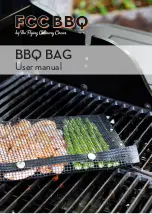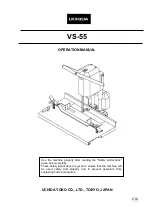
12
Op
er
at
ion
The Very First Time You
Barbecue
Perform an Initial Burn-Off
Heat the barbecue on the highest setting, with the lid
closed, for at least 20 minutes prior to barbecuing for
the first time.
Every Time You Barbecue
Meal-to-Meal Maintenance
The Meal-To-Meal Maintenance plan includes the
following simple, yet important, steps that should
always be performed prior to barbecuing.
Check for Grease
Your barbecue was built with a grease management
system that funnels grease away from food and into a
disposable container. As you cook, grease is channeled
down to the slide-out catch pan and into a disposable
drip tray that lines the slide-out catch pan. This
system should be cleaned each and every time you
barbecue to prevent fires.
1) Confirm that the barbecue is off and cool.
2) Remove the slide-out catch pan by pulling it
forward
(A)
.
3) Check for excessive amounts of grease in the
disposable drip tray that lines the slide-out
catch pan. Discard disposable drip tray when
necessary and replace with a new one.
4) Reinstall all components.
Inspect the Hose
Routine inspection of the hose is necessary.
1) Confirm that the barbecue is off and cool.
2) Check hose for any signs of cracking, abrasions, or
cuts
(B)
. If the hose is found to be damaged in any
way, do not use the barbecue.
Preheat the Barbecue
Preheating the barbecue is critical to successful
barbecuing. Preheating helps to prevent food from
sticking to the grills and gets the grills hot enough to
sear properly. It also burns off residue of a previously
cooked meal.
1) Open the barbecue lid.
2) Ignite your barbecue according to the ignition
instructions in this Owner's Manual.
3) Close lid.
4) When a recipe calls for medium or high heat,
preheat the barbecue with all burners on the
start/high position for 10 to 15 minutes or until
thermometer registers 500° F (260° C)
(C)
. For
low and slow cooking, there is no need to preheat
on high. Ensure your cooking grills are clean and
preheat as per the instructions in your barbecue’s
handbook.
Clean the Cooking Grill
After preheating, any bits of food or debris left over
from previous use will be easier to remove. Cleaned
grills will also prevent your next meal from sticking.
1) Brush the grills with a stainless steel bristle grill
brush immediately after preheating
(D)
.
m
DANGER: Do not line the slide-out catch pan or
cookbox with aluminium foil.
m
DANGER: Check the slide-out catch pan for
grease build-up before each use. Remove
excess grease to avoid a grease fire.
m
WARNING: Use caution when removing slide-
out catch pan and disposing of hot grease.
m
WARNING: Use heat-resistant barbecue mitts
or gloves when operating barbecue.
m
WARNING: Grill brushes should be checked for
loose bristles and excessive wear on a regular
basis. Replace brush if any loose bristles
are found on cooking grates or brush. Weber
recommends purchasing a new stainless steel
bristle grill brush at the beginning of every
spring.
m
WARNING: If the hose is found to be damaged
in any way, do not use the barbecue. Replace
using only Weber authorized replacement
hose.
m
WARNING: Keep ventilation openings around
cylinder clear and free of debris.
A
B
C
D






































